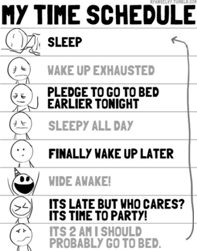
If you lose your job, your certainty tank is emptied all of a sudden. If you divorce, your love and connection tank goes down so quickly your life will be hard for a while. If you have a new job and you need to work exactly at the same times of the day and you need to accumulate lots of working days until you can have a holiday, then your variety level is at risk. If you have just joined a sewing club, where everyone there is so advanced you need to catch up, then your significance may suffer.
Personal development is a very good way to learn to fill our tanks. We learn to balance ourselves by discovering who we are, how we think, how we function and what makes us happy and successful. It is very important to know that the balance is different from one person to another. What one sees balance might feel out of balance for another. When we consider needs, they also contradict each other sometimes.
Conflicting needs
Our four needs are in constant conflict with each other and require each person to balance them based on his or her definition of balance.
When we have too much certainty, things are always the same, it gets boring and we seek variety.
When we have too much variety, too many things change too often, it is overwhelming and we seek certainty.
When we have too much love and connection, when everything we do connects us with others, we no longer feel special enough and we seek significance.
When we have too much significance, we feel so different from everybody else it is harder for us to connect to others and we seek love and connection.
We continually shift from one to the other based on our definition of what the needs are and what balance is for us.

Difficult people have a hole in one of their need tanks or a very high tank that is hard to fill. I can tell you that my need for variety is so high that I change the direction of the sofa, my bed and the dining table once a month. I even choose work that has a variety of things, because I find it hard to do the same things all day, every day.
At different times of our life, our needs changes. When we moved to Australia, which was our most energy-consuming move, I felt I needed more certainly and stopped travelling as we did before. Recently, we started having “the itch” for travelling again.
If you want to find your highest needs, do the following exercise. Remember, the results are only true now. If you do it again in a month, you may find you have changed a bit.
Rate the needs from 1-10 (1 = low need, 10= high need):
- Certainty – I want things to be stable, predictable and reliable. I want to feel secure and safe
- Variety – I want things to be interesting, exciting and moving. I want to try new things and have lots of different experiences
- Love and connection – I want to belong, to feel accepted and supported. I want people to like me and enjoy my company
- Significance – I want to stand out and be special and unique. I want to feel exceptional, valuable and important
Your highest need is the one you have a hole in and that needs boosting when you are being difficult. If you are helping a child, remember to tell them that we all have these needs and maybe share yours with them, so they do not feel too exposed. Match the explanation to their level of understand and ask, “From 1-10, how much do you think you want to be special? How much do you want to feel safe and know what’s going to happen ahead of time? How much do you want to be with other people who like you? How much do you want things to be different and exciting?”
Now, your goal is to fill the empty tank!
Holistic need fulfillment
People are holistic beings – our needs do not sit in the brain in separate compartments. I can get variety from making fun of people or get from changing the direction of my bed. I can get significance from showing off or from being kind. We can borrow from one area of life to use in another. Our tanks have no filters, so every kind of variety and significance is welcome.
Here is a list of things we can do to satisfy each of our needs:
Certainty
 Have a daily routine and do the same things every day, at least in the morning
Have a daily routine and do the same things every day, at least in the morning- Keep a diary and schedule your appointments and activities in advance
- Have a spiritual faith and practice regularly
- Exercise regularly
- Have a stable job – same hours, same days, same tasks
- Plan a party before you have it
- Plane your weekly schedule on Sunday night
- Plan your food for the week in advance
- Keep a work roster – any planning gains certainty
- Keep your workspace, bag and room organized
- Clean regularly
Variety

- Go to the movies
- Travel to new places
- Have stimulating conversations about new topics
- Meet new people
- Do art – paint, sculpt, create
- Throw a party
- Go to concerts
- Take a holiday
- Learn something new
- Volunteer (may also give love & connection and significance)
- Go out to a restaurant
- Read a new book
- Break your routine, at least on weekends
Significance

- Helping others
- Volunteer
- Teach
- Buy special clothes
- Be kind
- Be in a relationship – it makes you the most important person in someone’s life (also good for love & connection and possibly certainty)
- Be a parent – oh, the pride
- Have a (great) profession
- Learn a (rare) skill
- Pursue a talent – solo music, art or individual sport
- Be a leader
- Get degrees and other formal qualifications
- Have a (special) hobby
- Collect something (rare)
- Be really good at our job
Love & Connection
All you need is love
– John Lennon

- Join a club
- Go to spiritual gatherings
- Join a community group
- Be in a relationship
- Have children
- Teach
- Be a leader
- Have friends
- Help others
- Volunteer
- Have a party or go to a party
- Go out on a date or with friends
- Keep in touch by email, phone or Skype
- Send birthday/holiday cards to family and friends
- Spend time on social media sites and grow your circle(s) of “friends”
- Go to (or organize) family gatherings
If we can direct the difficult people to fill their highest need tank or create the circumstances that fill it for them, their demands will decrease. Our aim is to reach a point where the level of the difficulty is not so severe that others avoid their company. Remember, their difficult behavior creates a cycle of avoidance, which makes it even harder for them to notice and learn the social cues. We have to bring them back into society and interaction, because they will just keep doing everything they can, even if it is not comfortable to others, to fulfill their needs.
If you are a difficult person (at least in someone’s view), I hope this series was helpful for you and you will now begin of a new life where others do not avoid your company. If you are helping a difficult person, I hope the tips here were helpful for you to support and help with grace.
As I said at the beginning, if you are aware of your difficulties, you can get help from a professional and you can get help from someone who loves you. Remember, you cannot force loved ones to help you. They need to be willing and they need to have the emotional stamina to be able to help you.
Your third option is to get a mentor – someone who is not close to you who is willing to stick around and help you go through this process. With awareness and persistence, the sky is the limit.
Happy life,
Ronit
This post is part of the series How to Manage Difficult People:
- How to manage difficult people: Energy Consumers
- How to manage difficult people: Types of difficulties
- How to Manage Difficult People: More Difficult People
- How to Manage Difficult People: Who is Not Difficult
- How to Manage Difficult People: What are They Missing?
- How to Manage Difficult People: What They Really Need
- How to Manage Difficult People: Helping a Difficult Person
- How to Manage Difficult People Using "Why?" and "What?"
- How to Manage Difficult People: A Holistic Approach
 Have a daily routine and do the same things every day, at least in the morning
Have a daily routine and do the same things every day, at least in the morning













